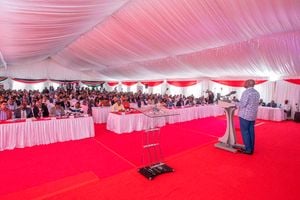
Deputy President Rigathi Gachagua.
Farm produce middlemen in the Mt Kenya region have asked Deputy President Rigathi Gachagua to first hold consultative meetings with them to understand their role in linking farmers to urban markets.
This comes after Mr Gachagua said his top priority was to "eradicate cartels" in the agricultural value chain, starting with the dairy, tea and coffee sectors before moving on to other crops.
The law, albeit softly, requires brokers to be registered with the relevant government ministry, alongside money changers, gold and silversmiths.
Cited as the Brokers Act whose date of commencement was on December 24, 1930, it states that “official brokers shall be of two classes: official and ordinary and their licensing be of three-year renewable term.
Section two of the Act states that anyone wishing to become an official broker must find two sureties approved by the licensing authority or such person as it may appoint, to give a bond of two thousand shillings each for his good behaviour.
Central Region Fresh Produce Marketers’ Association Chairman Dennis Wairimu told Nation that “the declarations Mr Gachagua is making on how he will eradicate brokers sound uninformed since everyone in business at times executes some form of brokerage”.
Mr Wairimu, who admits he is not a registered broker despite being its chairman, said Mr Gachagua "would be best placed to understand what brokerage is as he likes to talk about how he is the custodian of the ruling Kenya Kwanza Alliance shareholders' register".
Electoral support
He said: "Just as Mr Gachagua uses electoral support to get benefits for many stakeholders from President William Ruto's government, it is the same way brokers use harvests to get benefits".
He adds: "Ask him if he is registered as an official political broker... It's about a common understanding that there is a window of opportunity in the value chain and we exploit it to make money on a willing buyer, willing seller arrangement."
Mr Wairimu says brokers create jobs for transporters, casual labourers hired to harvest, grade, pack and load, and help unskilled youths in the market earn a living by managing parking areas, providing security and helping with sales.
But former Murang'a governor Mwangi wa Iria accuses brokers of distorting everything in the value chain to the point where they own the prices.
"I came to power in Murang'a in 2013, when most products were sold at absurd prices. A litre of milk was Sh10, while a piece of the best Hass avocado was Sh1. After I got rid of the brokers, a litre of milk jumped to Sh35 and a piece of avocado skyrocketed to Sh30," the former governor said.
Mr Wa Iria said: "If I had been mandated by law to continue as governor, a litre of milk would be Sh70 and a piece of avocado would be Sh50. Brokers should become producers or manufacturers. They are just manipulating market structures to reduce farmers' incomes.
Political class
Mr Wa Iria said brokers come in many forms and are sometimes even supported by the political class, "for example how they ganged up to bring down Murang'a County Creameries (MCC) so that they could take over pricing and that is why area milk prices have never increased from the Sh43 per litre I left behind".
Mr Wa Iria insisted that "what farmers should be demanding are value addition units, access to bulk markets in producer groups and the elimination of value chain criminals".
The brokers have made it their agenda to kill direct access to the market unless you are selling 20 pieces of avocados at the local market.
Nyandarua Governor KIarie Badilisha lamented to President William Ruto the grip that brokers have on milk, potato, vegetable and carrot farmers.
"We need value addition. We need infrastructure that will increase the shelf life of our crops. Perishability is a component of the value chain that brokers use to devalue produce," said Mr Badilisha.
He added that the influence brokers wield in the market is immense. "They are the price masters who have information on all the markets, check the prices and know the farm-gate prices of all the growing areas, thus stifling any effort to put money in the pockets of farmers," he said.
Trade ministry consultant Dr Peter Mbae said: "We are moving to a new order where we have to register all our traders...we have to know each other by name and physical address. So even these brokers will be told to come and tell us what they are doing in the value chain".
In an interview with Inooro TV, Dr Mbae said the move would come after parliament passed the proposed laws.
The government has since caused a stir after it was leaked that the intention was to raise more revenue by registering all traders for a fee.
"The intention was not as reported... the drive is to ensure that we have data on who is trading what in our structured markets so that we can all have a good relationship and engage in matters of mutual benefit. No registration fee has been set as yet and the legislation has yet to be passed, but it will help weed out the rogue traders from the market system," he said.










